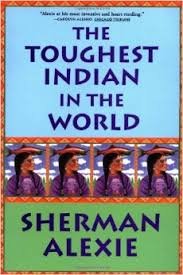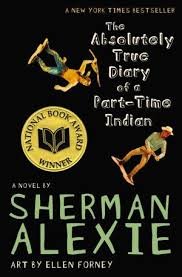To learn more about Sherman Alexie, please visit http://fallsapart.com/
Sherman Alexie is a poet, short story writer, novelist, and performer.
He has published 24 books including What I've Stolen, What I've Earned, poetry, Blasphemy: New and Selected Stories, and The Absolutely True Diary of a Part-Time Indian, a novel for children. He has also recently published the 20th Anniversary edition of his classic book of stories, The Lone Ranger and Tonto Fistfight in Heaven. Smoke Signals is the movie he wrote and co-produced,
Alexie is a Spokane/Coeur d'Alene Indian. He was born on October 7, 1966 and grew up in Wellpinit, Washington, on the Spokane Indian Reservation. Alexie has been an urban Indian since 1994 and lives in Seattle with his family.
Sherman Alexie speaks to the single story and multicultural literature. He also references stereotypes and cultural authenticity in literature.
Alexie's poetry, short stories and novels explore themes of despair, poverty, violence and alcoholism among the lives of Native American people, both on and off the reservation. They are lightened by wit and humor. According to Sarah A. Quirk from the Dictionary of Library Biography, Alexie asks three questions across all of his works: "What does it mean to live as an Indian in this time? What does it mean to be an Indian man? Finally, what does it mean to live on an Indian reservation?" The protagonists in most of his literary works exhibit a constant struggle with themselves and their own sense of powerlessness in white American society.
Alexie’s writings are meant to evoke sadness, but at the same time he uses humor and pop culture that leaves the readers with a sense of respect, understanding, and compassion. Alexie’s influences for his literary works do not rely solely on traditional Indian forms. He “blends elements of popular culture, Indian spirituality, and the drudgery of poverty-ridden reservation life to create his characters and the world they inhabit,” according to Quirk. Alexie's work is laced with often startling humor. According to Quirk, he does this as a "means of cultural survival for American Indians—survival in the face of the larger American culture's stereotypes of American Indians and their concomitant distillation of individual tribal characteristics into one pan-Indian consciousness." https://en.wikipedia.org/wiki/Sherman_Alexie
AWARDS
National Endowment for the Arts Poetry Fellowship, PEN/Hemingway Award for Best First Book of Fiction, Lila Wallace-Reader's Digest Writers' Award, American Book Award, Granta Magazine: Twenty Best American Novelists Under the Age of 40, New York Times Notable Book, People Magazine: Best of Pages
The New Yorker: 20 Writers for the 21st Century, PEN/Malamud Award, National Book Award, Young People's Literature, American Library Association Odyssey Award as the year's "best audiobook for children or young adults", PEN/Faulkner Award, Native Writers' Circle of the Americas Lifetime Achievement Award, Puterbaugh Award, the first American Puterbaugh fellow, California Young Reader Medal
In 2012, Arizona's HB 2281 banned the study of Alexie's works, among others', in Arizona schools. Alexie's response:
“He loved her, of course, but better than that, he chose her, day after day. Choice: that was the thing.”
― The Toughest Indian in the World
“
Life is a constant struggle between being an individual and being a member of the community.” ―The Absolutely True Diary of a Part-Time Indian
“Poetry = Anger x Imagination” ― Sherman Alexie, One Stick Song
Sherman Alexie speaks from his Native American background and brings cultural authenticity to his writings. His writings challenge the notions of the status quo and this is made most evident by the history of banning his books in Arizona schools. He writes with an honesty and experience that provides mirrors for Native Americans to find themselves in literature and windows so that those who are not Native American can have an insight into the Native American culture. His writing provides the reader with a reference for life on a reservation and a look at the impact of the not so pretty parts of reservation life, from alcoholism to lack of education. His move into children's literature has won awards but most importantly, it provides young adults with an opportunity to read culturally relevant and authentic Native American literature.



